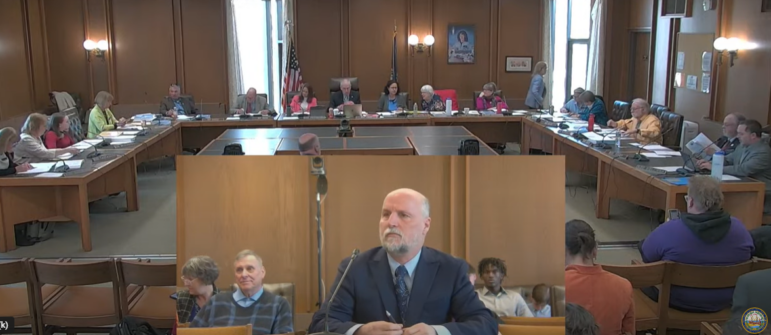The Rochester police officer who is out $20,000 from unsuccessfully trying to remove his name from the secret “Laurie” list of potentially dishonest cops is upset that legislation that would have protected law enforcement is now dead in the water.
Officer John Gantert appealed his Laurie designation to Superior Court, then to the state Supreme Court, which ultimately ruled against him and said any changes in the Laurie system would be up to the Legislature.
“I just am absolutely disappointed with the whole system,” Gantert said. “It sounds like they took the path of least resistance because it’s easier.”
Gantert testified in front of state Sen. Sharon Carson’s legislative study commission last October. The commission’s work resulted in Senate Bill 402, which recently “died,” Carson said.

Sen. Sharon Carson, R-Londonderry
Carson, R-Londonderry, fought for police who complained they had no due process rights to fight the Laurie dishonesty designation. Carson’s bill would have also prohibited firing a police officer solely for having been placed on the list.
Prosecutors maintain the secret Laurie lists to determine whether information from police personnel files should be revealed to defendants before the officer testifies. If there is discipline for dishonesty in the officer’s file, it could be considered exculpatory evidence, or evidence that is favorable to a defendant that should be disclosed. It could then be used by the defense to impeach the officer’s testimony.
“It died,” Carson said of SB 402. “We had created a balance between the police and the courts. Then it got into the House and they upset the balance.”
Members of the study commission wrestled with a host of questions that highlighted the difficulty balancing the rights of police against the rights of criminal defendants.
“It was too far out of balance,” Carson said. “That’s the only committee of conference that I walked away from.”
Gantert’s legal troubles started in 2011. He said he mistakenly filled out a form used to gauge dangerousness in a domestic violence case, was fired and then reinstated. Gantert acknowledges he made a mistake, but said it did not involve any deceit.
According to the state Supreme Court’s decision, Gantert didn’t realize the arresting officer had already filled out the form so he filled one out himself after watching a videotaped interview with the victim.
“When asked why he had put incorrect information on the (form), (Gantert) stated that ‘he had no information to work with and that he knew that the LAP form was required to be sent to the County Attorney’s Office,’” the court wrote.
“(W)e think that the Legislature, rather than this court, is the proper body to regulate the use of ‘Laurie Lists,’” the court said.
Gantert said he saw a “small light at the end of the tunnel” because the memo that outlines Laurie procedures includes a provision for officers to be taken off the list after 10 years if there are no other infractions.
But the Attorney General’s Office has told county attorneys to ignore that provision. In fact, if an officer was removed from the list after 10 years, the attorney general told county attorneys to put the name back on the list.
In 2003, Gantert said he decided between joining the Air Force to pursue a career in aviation or becoming a police officer.
“I would have gone into the Air Force if I knew this kind of thing would happen,” he said.
While his union paid some of his legal bills, it still cost him $20,000 in legal fees, expenses and lost wages. And with the Laurie designation, it is unlikely he will ever be promoted. Prosecutors can be hesitant to call an officer to testify if there is a possible Laurie issue to disclose.
The Laurie list label comes from the state Supreme Court case State v. Laurie in which Carl Laurie’s murder conviction was overturned in 1995 because the lead investigator was known to be dishonest.
Some of the people Gantert deals with in Rochester know of his situation, he said.
“For what it’s worth, they tell me, ‘you have my respect.’ I treat people good,” Gantert said. “They know they get fair treatment from me.”
Before his run-in with the Laurie list, Gantert said he considered running for elected office after he retires.
“Now that I’ve had a little taste of it, I want no part of politics,” Gantert said.





